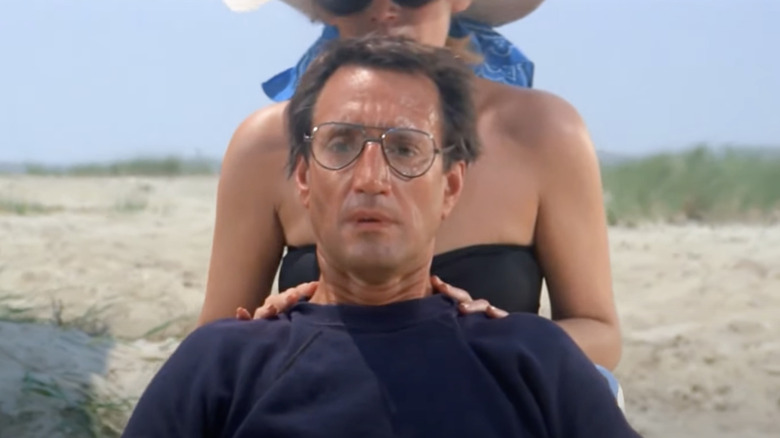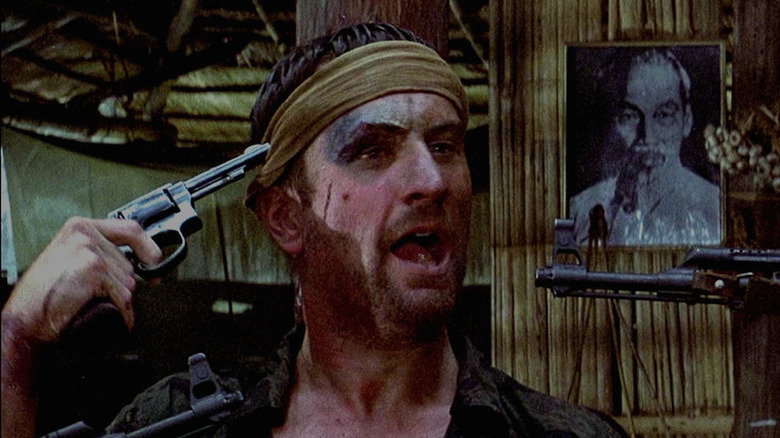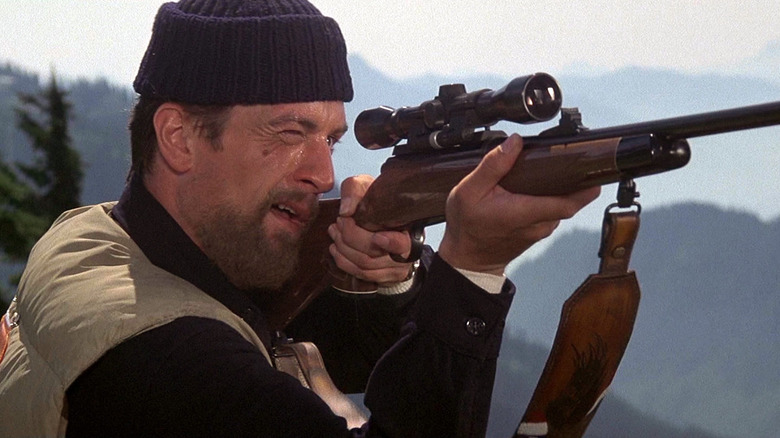Why Roy Scheider Turned Down The Deer Hunter, According To Producer Thom Mount
After the historic success of "Jaws," Roy Scheider was a golden boy at Universal Pictures. The studio had him under contract for three more films and they naturally wanted him in "Jaws 2." Scheider did star in that sequel before bowing out of the sinking franchise that should have been left alone in the first place. However, the other two films could be of Scheider's choosing — a one for them, two for you deal.
As chronicled by GQ, Scheider was interested in Michael Cimino's "The Deer Hunter" and would have played Michael Vronsky. However, as you probably know, he wound up not starring in that film. Producer Thom Mount dispelled rumors that Scheider was unhappy with the script. Instead, Mount believes, it was a dispute over compensation:
"I have heard over the years that the reason given for Scheider not doing the film is that he was unhappy with the script. I very much doubt that to be the case, it was a stunning script; Universal were not in the habit of supporting films with poor scripts. What I do know is that over discussions with his lawyer he felt the role in 'The Deer Hunter' was going to be a starring role and that his fee, the deal he had signed, did not reflect that. So the unhappiness he subsequently had with 'The Deer Hunter' was purely a financial one, the deal he signed with us was now disproportionate, in his eyes, and did not reflect the rise his colleagues had enjoyed within the community."
In 1979, a year after "The Deer Hunter," Scheider starred in "All That Jazz," produced by 20th Century Fox and Columbia Pictures, rather than take a different project at Universal.
De Niro enters the picture
Scheider passing on "The Deer Hunter" opened the door for Robert De Niro. The actor already had "Raging Bull" in the works with Martin Scorsese and was planning to take a break from acting before shooting that film. De Niro's wish was understandable, given he ended up delivering such a physically taxing and emotionally draining performance as Jake LaMotta. In the meantime, though, he found himself won over by the script for "The Deer Hunter" and chose to forgo his hiatus to star as Michael Vronsky. De Niro recalled to GQ:
"I liked the story and the dialogue. I just thought it was a terrific script. It was so simple and it seemed so real to me. The characters spoke to me. I liked that they didn't say much, that there wasn't anything that was condescending or patronizing toward them."
Both "Raging Bull" and "The Deer Hunter" are about self-destruction, though in the former it's driven by Jake's insecurities and short temper, not PTSD like in "The Deer Hunter." Even so, De Niro delivers some of his most powerful, least glamorous work in both films; they're always ranked at the top of his filmography for good reason.
A superior choice
In the GQ piece, Mount recalls: "Now when we heard that Robert De Niro had expressed an interest none of us on the studio management team were unhappy to see Roy decide not to star in the film. It was our judgment that Bob was a far better piece of casting and a far better actor." I think the evidence of this is the film's most tragic scene.
The poster shows De Niro's likeness holding a revolver to his head, but in the film, it's Nick (Christopher Walken) who meets his end in Russian Roulette. Unlike Michael and their friend Steve (John Savage), Nick never goes back home after his tour of duty, instead remaining in Vietnam. Hollowed out by his experience as a POW, he becomes a Russian Roulette performer. The night Michael finds him is the night he finally shoots a fatal shot.
It's hard for me to picture Scheider doing something similar to De Niro's distraught, sobbing performance as he holds Nick's dead head in his hands. Even when he showed vulnerability, it was silent and dignified (take the scene in "Jaws" where Chief Brody is accosted by the mother of the shark's victim Alex Kintner). "The Deer Hunter" needed more visceral acting and De Niro was up for the task.


